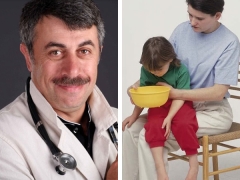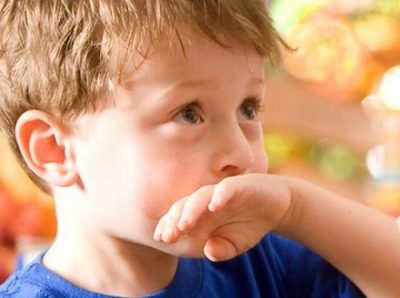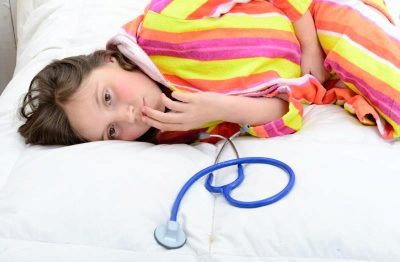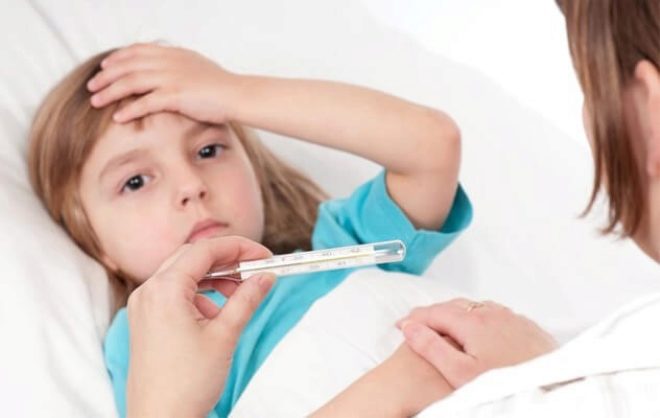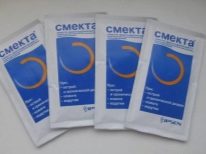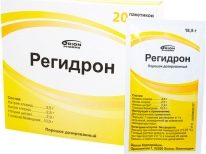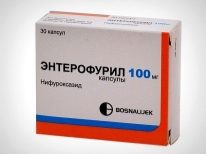Dr. Komarovsky: what to do if a child has vomiting
All moms and dads are well aware that vomiting in children is not such a rare occurrence. However, in practice, when confronted with an attack, many simply get lost and do not know how to give the baby first aid, what to do and where to call. Authoritative pediatrician Yevgeny Komarovsky, the author of numerous articles and books about children's health, tells why vomiting happens and what to do with an adult.
About vomiting
Vomiting - a protective mechanism, reflex eruption of the contents of the stomach through the mouth (or through the nose). During an attack, the abdominals contract, the esophagus expands, the stomach itself relaxes and pushes everything in it up the esophagus. This rather complex process regulates the emetic center, which in all people is located in the medulla oblongata. Most often, vomit is a mixture of undigested food debris and gastric juice. Sometimes they may contain impurities of pus or blood, bile.
The most common cause of childhood vomiting is food poisoning. Vomiting can be observed with various infectious diseases: rotavirus infection, scarlet fever, typhus.
Less commonly, this problem is triggered by accumulated toxins, such a condition can occur with serious kidney disease.
Other causes of gagging include stomach and intestinal diseases, neurological diagnoses, head injuries.
In children, vomiting can often be triggered by strong emotional upheaval.
Kinds
Doctors distinguish between several types of child vomiting:
- Cyclic vomiting (acetonemic).
- Renal.
- Hepathogenic.
- Diabetic.
- Cardiac.
- Psychogenic.
- Cerebral.
- Bloody.
In most cases, vomiting in children begins at night. Baby wakes up from severe nausea. In this situation, it is important not to be frightened and not be confused. The actions of the parents should be calm and confident.
The younger the child, the more dangerous it is for vomiting, since dehydration can occur, which can be fatal for babies.
A single vomiting (without any additional symptoms) should not cause the child to be particularly anxious to the parents, says Yevgeny Komarovsky. The fact is that in this way the body is “cleansed” from the accumulated toxins, food elements that the child could not digest. However, parental inaction can be fraught with tragic consequences in cases where vomiting is repeated, as well as if there are other symptoms indicating violations in the body.
The most common cause of gagging in a child is food poisoning. Poison can enter the body of crumbs with different products: dairy, meat, seafood, vegetables and fruits.
Overwhelmingly gag reflex cause nitrates and pesticides, that process fruits and vegetables. Even very high-quality products of meat origin can cause severe poisoning if they are cooked incorrectly.
Yevgeny Komarovsky emphasizes that the first symptoms of food poisoning usually begin to appear within 4 to 48 hours after a meal. Quite often, you can stop vomiting, which is provoked by food, on your own, at home. However, Yevgeny Komarovsky recalls that there are situations in which moms and dads should not engage in self-healing. Medical help is required:
- Children from 0 to 3 years.
- Children whose vomiting occurs on the background of increased body temperature.
- Children who have vomiting diarrhea and abdominal pain (all together or only part of the symptoms) have lasted for more than two days.
- Children who are not “alone” in their disease (if other household members have similar symptoms
There are situations in which the child needs emergency medical care as soon as possible. Call "Ambulance" should be in one or more of the following conditions:
- Vomiting arose after eating mushrooms.
- Vomiting is so intense that the baby cannot drink water.
- Vomiting is accompanied by clouding of consciousness, incoherent speech, impaired coordination of movements, yellowing of the skin, dry mucous membranes, and the appearance of a rash.
- Vomiting is accompanied by a visual increase (swelling) of the joints.
- Against the background of repeated vomiting, urination is absent for more than 6 hours, urine has a dark shade.
- In the vomit and (or) feces there are impurities of blood, pus.
In anticipation of the arrival of the doctor, the child must be laid on its side so that during the next vomiting attack the child does not choke on vomitus. The chest toddler should be kept on hand, on its side. No medication is needed.
So that the doctor can more quickly understand the true cause of the child’s condition, Parents should remember in as much detail as possible what the crumb ate in the last 24 hours, what he drank, where he was and what he did. In addition, mom and dad have to carefully examine the vomit, then to tell the doctor about what color they are, the consistency, whether there is an unusual smell, whether they contain blood or pus.
Analyzing the color
Dark vomit (coffee grounds) may indicate serious problems with the stomach, even peptic ulcer.
If there is an admixture of bile in the masses and there is a bitter-sweet smell, you can suspect a malfunction of the gallbladder and biliary tract.
Green color vomiting may indicate the neurological nature of the reflex, the same happens in vomiting in a strong stressful situation, when the child can not cope with anxiety and feelings.
It is recommended to leave samples of emetic and fecal masses of a sick child before the arrival of the doctor in order to show them to a specialist. This will facilitate the most rapid and accurate diagnosis of the true cause of the condition.
Vomiting in an infant can be a completely natural process of becoming a digestive function, but it is better if a doctor ascertains it. Komarovsky emphasizes that often in infants, vomiting is a quite expected cause of banal overeating, if parents are too zealous in wanting to feed their child more and show more.
Vomiting can also be of a different nature - allergic, traumatic, and also inflammatory. In other words, this reflex accompanies a great many of the most diverse diseases, some of which require prompt hospitalization with subsequent surgical assistance, and therefore it is not worthwhile to underestimate vomiting attacks.
So, parents should make every effort not to stop vomiting at any cost and try to treat something with folk remedies, but in order to carefully observe. It will be just fine if they can provide the following information to the doctor who came to the call:
- Frequency and frequency of attacks (at what intervals vomiting occurs, how much it lasts).
- Does it become easier for the child after the next attack, decreases pain in the abdomen.
- What is the approximate volume of vomit, their color and are there any impurities.
- What was sick baby for the last year, for the last two weeks.
- What a crumb ate, and whether parents have a suspicion of food poisoning.
- Has the baby's weight changed in the last 2 weeks?
Tips
If a child has some of the above symptoms, but does not vomit, Komarovsky advises to trigger a reflex yourself.To do this, the baby should be given 2-3 glasses of warm water or milk to drink, and then gently insert the fingers into the oropharynx and slightly move them. You can use your fingers or a spoon to slightly press the root of the tongue.
Feed the baby does not need anything. However, watering is a must. In this case, you should know that otpaivanie child with vomiting - a whole science, it must be carried out strictly according to the rules. First, says Yevgeny Komarovsky, drinking should be fractional, but very frequent. One-time amount - a few sips. Secondly, the temperature of the water should be similar to the temperature of the body, so the liquid will be more likely to be absorbed, which will save the child from dehydration. When asked what to drink, the doctor answers that oral rehydration solutions or homemade saline solutions are the best option. If desired, you can give your child non-carbonated mineral water, tea, compote.
In no case do not need to add to drink sugar, jam, honey. If the child flatly refuses to drink what is supposed to, offer him what he likes - juice or a sweet drink, but at the same time dilute it with water so that the resulting drink is as clear as possible.
Activated carbon It is useful to give, but only in strictly designated proportions - 1 gram of the drug per kilogram of the child’s weight, not less. If the temperature rises, you can give the baby antipyretic, Paracetamol is best suited.
It is not necessary to transport the child to the medical institution independently. In the car, the baby can “shake” even more, and the attacks will intensify. Komarovsky warns parents to give alcohol solutions and potassium permanganate when vomiting.
Child-approved medications - “Smecta», «Regidron», «Enterofuril».
Komarovsky encourages parents to be prudent and not to give children vomit means that are often advised by “experts” of traditional medicine (for example, milk-yolk mixture), since such “treatment” can only worsen the child’s condition.
Feed after vomiting should be gradually, without overloading the stomach - in small portions, avoiding fatty, sweet, salty and sour.
What to do when vomiting a child will tell Dr. Komarovsky in the video below.
